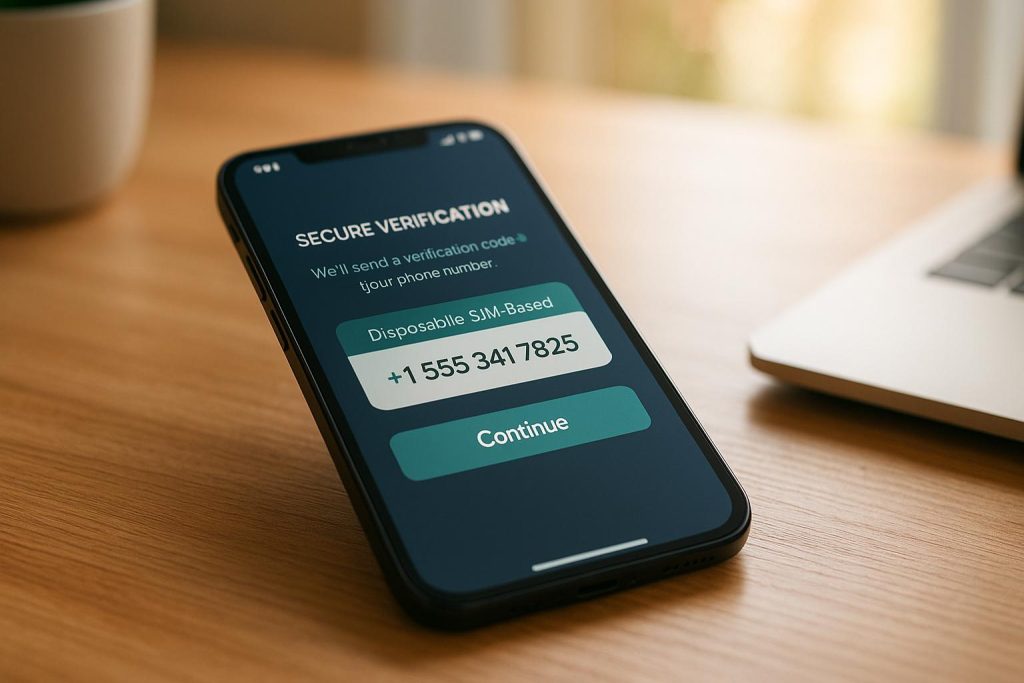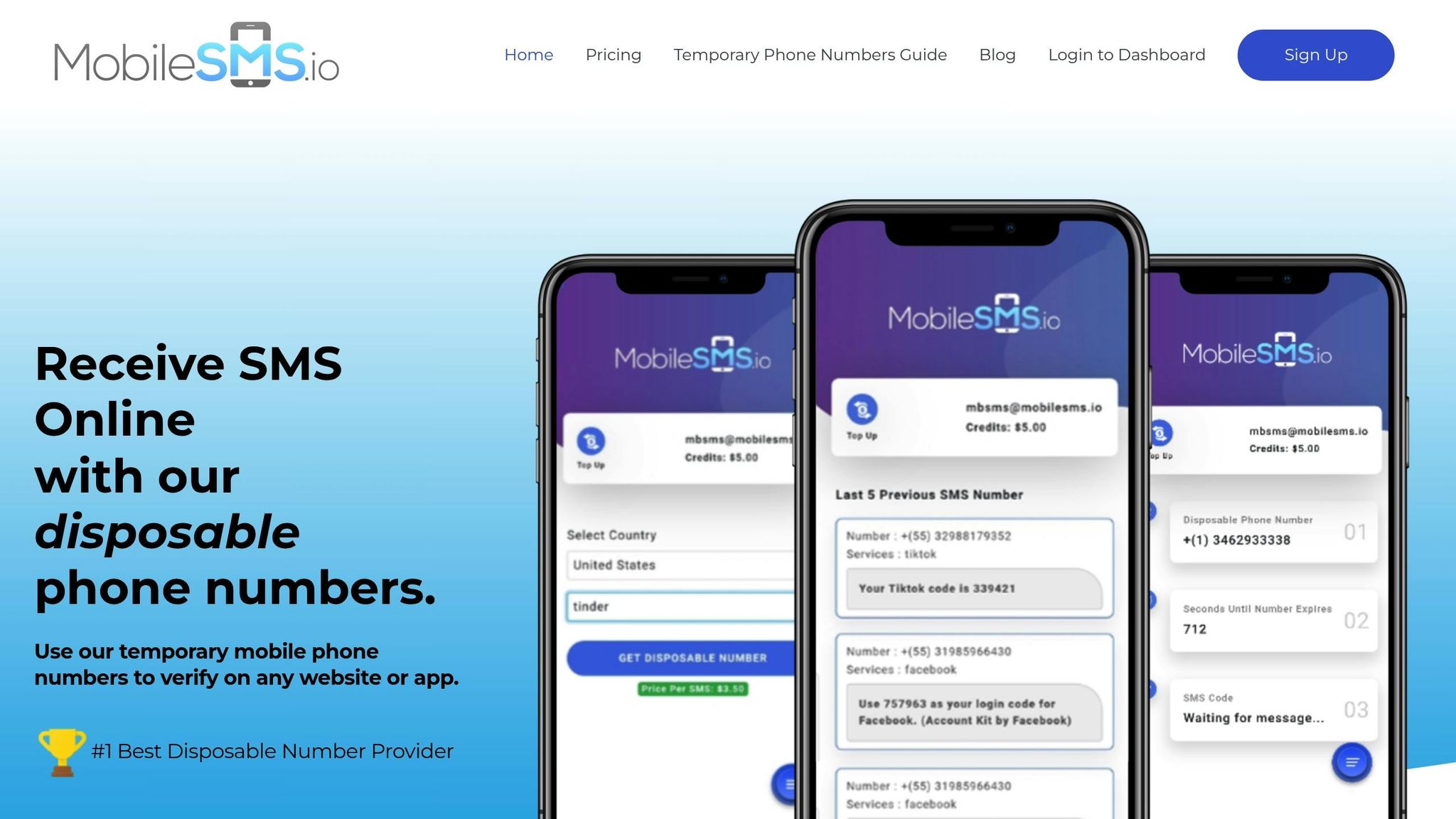SIM swapping is a growing threat to your online security. Attackers trick mobile carriers into transferring your phone number to their SIM card, giving them access to your accounts and sensitive information. This can lead to stolen passwords, financial losses, and identity theft.
The solution? Use disposable SIM-based numbers. These temporary numbers protect your personal phone number, limit exposure to attacks, and reduce risks tied to SMS-based two-factor authentication (2FA). Services like MobileSMS.io provide short-term, real SIM-card numbers for secure verifications without sharing your personal data.
Key Benefits of Using Disposable SIM-Based Numbers:
- Protect your personal number by keeping it private.
- Minimize risks with time-limited numbers (e.g., 10 minutes).
- Prevent attackers from exploiting your accounts even if one number is compromised.
Quick Comparison:
| Security Aspect | Personal Number | Disposable SIM-Based Number |
|---|---|---|
| Exposure Time | Continuous | Limited (e.g., 10 minutes) |
| Attack Surface | Multiple services linked | Single-service isolation |
| Recovery Risk | High | Minimal |
| Privacy Impact | Personal number exposed | No personal data shared |
Disposable SIM-based numbers are a simple yet effective way to safeguard your online accounts and protect against SIM swapping attacks.
SIM Swapping Prevention Secrets Experts Use Daily
SIM Swapping: Basic Concepts and Methods
SIM swapping is a type of identity theft where attackers take control of a victim’s phone number by transferring it to a SIM card they control. This is usually done by exploiting weaknesses in mobile carrier customer service processes through social engineering. Here’s how it typically plays out:
Steps in a SIM Swap Attack
- Information Gathering
The attacker starts by gathering personal information about the victim, such as their name, contact details, and answers to common security questions. - Contacting the Carrier
Armed with this information, the attacker contacts the victim’s mobile carrier, pretending to be the account holder. They use the collected details to pass the carrier’s security checks. - Number Transfer
Once the carrier is convinced, the victim’s phone number is transferred to the attacker’s SIM card. The victim loses access to their phone service, while the attacker gains control of incoming calls and text messages.
These steps show how attackers exploit weak points in the system, setting the stage for more severe consequences.
Impact of SIM Swapping
The effects of SIM swapping are immediate and far-reaching. Victims often experience:
- Loss of phone service, making it impossible to receive calls or texts, including SMS verification codes.
- Being locked out of accounts that rely on their phone number for authentication.
But the damage doesn’t stop there. Attackers can use their access to SMS codes to reset passwords and infiltrate sensitive accounts, such as banking apps, investment platforms, and digital wallets. This opens the door to financial theft and broader identity fraud.
These risks underline why improving SIM-based security is so important, especially when it comes to protecting accounts tied to phone numbers.
Protection Through SIM-Based Numbers
Physical SIM cards offer a strong layer of hardware-based security, and using temporary SIM numbers adds another shield by keeping your personal line safe from online threats. Let’s explore why SIM-based numbers are a smart choice for protecting against SIM swapping.
SIM Card Security Features
SIM cards come equipped with encrypted keys that authenticate the connection between your device and the network. This hardware-driven security makes them resistant to unauthorized access. By ensuring verification codes are sent through trusted carrier networks instead of less secure virtual systems, SIM cards provide a reliable safeguard.
In addition to their built-in security, using separate numbers for specific tasks adds an extra layer of protection for your primary phone line.
Keeping Personal Numbers Private
Using a dedicated SIM-based number for online services helps create a clear division between your personal line and your online activities. This separation acts as a buffer, reducing the risk of a breach spreading across multiple accounts. For example, MobileSMS.io offers real SIM-card numbers that work smoothly with platforms like Google, Telegram, and WhatsApp. This way, even if one service’s number is compromised, your primary number and other accounts remain unaffected.
Why Time-Limited Numbers Work
Temporary numbers take security a step further by limiting exposure. These numbers are active only for a short time, just long enough to complete verification, and then they’re deactivated. This approach removes long-term vulnerabilities.
"MobileSMS.io ensures your privacy by allowing you to use our disposable numbers instead of your personal number. This way, you never have to share your personal information with any website or app."
Here’s how time-limited numbers enhance security:
- They narrow the window of opportunity for SIM swap attacks.
- Once they expire, they can’t be used for account recovery attempts.
- Each verification uses a new number, making it harder to detect patterns.
- There’s no lasting link between these temporary numbers and your accounts.
This multi-layered strategy not only protects against SIM swapping but also ensures secure SMS verification. By combining hardware-based security with temporary numbers, you can keep your personal information safe while staying connected.
sbb-itb-5a89343
MobileSMS.io Security Features
MobileSMS.io takes security seriously by utilizing real SIM-card technology from trusted mobile carriers. This approach provides a solid defense against SIM swapping attacks by relying on the built-in protections of established carrier networks. Let’s break down the key security features that make MobileSMS.io a reliable choice.
Real SIM Card Technology
MobileSMS.io uses authentic SIM cards sourced from reputable carriers. This ensures an added layer of security, leveraging the safeguards already embedded in carrier networks. Since 2018, this technology has been instrumental in securing account verifications for platforms like Google, Telegram, and WhatsApp. Now, let’s look at the variety of phone number options available.
Number Options and Coverage
MobileSMS.io offers flexible phone number solutions tailored to different verification needs, all while reducing security risks. With coverage spanning over 100 countries and a strong emphasis on U.S.-based numbers, users have plenty of options to choose from. Here are the two main types of numbers offered:
| Number Type | Duration | Best Used For | Security Benefits |
|---|---|---|---|
| Disposable Numbers | One-time use | Single verifications | High security for short-term needs |
| Long-term Rentals | 7–90 days | Ongoing account requirements | Dedicated and consistent protection |
In addition to these options, MobileSMS.io prioritizes user privacy with robust data protection practices.
Data Protection Methods
MobileSMS.io implements stringent measures to keep user data safe. Each number is authenticated through trusted carriers and deactivates after use to prevent unauthorized access. By isolating verifications, the service ensures personal data remains secure. They also adhere to strict compliance standards and accept a variety of payment methods, including cryptocurrency, for added privacy. This comprehensive approach allows users to verify accounts confidently, without exposing their personal phone numbers to SIM swapping threats.
Conclusion: Preventing SIM Swapping with Better Numbers
Enhancing your digital security requires proactive measures, and using SIM-based disposable numbers is a smart way to shield your identity from SIM swapping attacks.
These temporary numbers act as a barrier between your personal phone number and online services. By limiting the lifespan of a number to just 10 minutes, you significantly reduce the window of opportunity for attackers to exploit traditional SIM swapping methods.
What makes this approach even more secure is the use of real SIM-card technology. This leverages trusted carrier networks while isolating each service with a unique number. It creates a clear boundary, ensuring that even if one number is compromised, the damage is contained.
Comparison: Personal vs. Disposable Numbers
| Security Aspect | Personal Number | SIM-Based Disposable Number |
|---|---|---|
| Exposure Time | Continuous | Limited to 10 minutes |
| Attack Surface | Multiple services linked | Single-service isolation |
| Recovery Risk | High (permanent number) | Minimal (temporary number) |
| Privacy Impact | Personal number exposed | No personal data shared |
FAQs
How do SIM-based disposable numbers help prevent SIM swapping?
SIM-based disposable numbers offer an added shield of privacy by keeping your personal phone number hidden. Using a disposable number for SMS verification helps minimize the chances of your primary number falling into the wrong hands.
Unlike regular phone numbers, which are connected to your personal identity, these temporary numbers are not directly tied to you. This makes it much tougher for cybercriminals to carry out attacks like SIM swapping, as your actual number stays secure and inaccessible.
How do disposable SIM-based numbers enhance security for two-factor authentication?
Temporary SIM-based numbers offer a secure solution for receiving SMS verification codes without revealing your personal phone number. These numbers are designed for short-term use, making them perfect for one-time tasks like account sign-ups or verifications.
Using a disposable number also minimizes the risk of SIM swapping attacks – a tactic where hackers try to take control of your phone number. This extra layer of privacy safeguards your accounts from unauthorized access and helps keep your personal details protected.
How do disposable SIM-based numbers help protect against SIM swapping attacks?
Disposable SIM-based numbers offer an extra layer of protection by keeping your personal phone number separate from your online accounts. This separation helps reduce the threat of SIM swapping – a type of fraud where attackers take control of your phone number to access sensitive accounts.
Using a disposable number limits the exposure of your primary phone number, making it more difficult for cybercriminals to target you. While this step can greatly decrease risks, it’s important to remember that no solution is foolproof. For stronger security, pair this approach with other measures like using strong passwords and enabling two-factor authentication.


